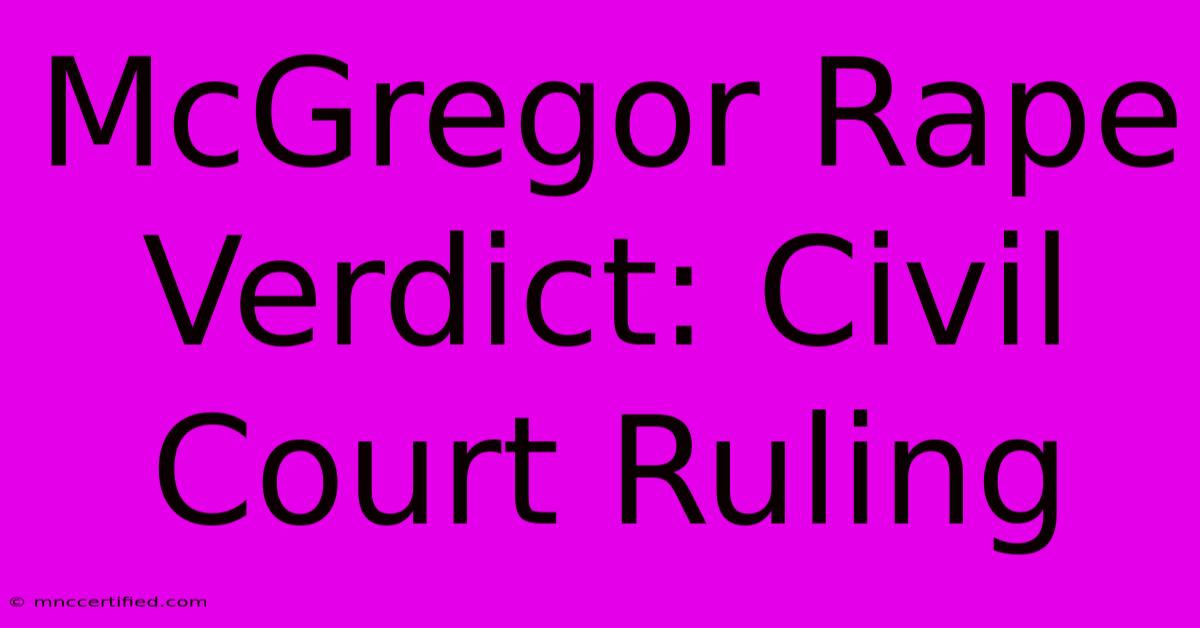McGregor Rape Verdict: Civil Court Ruling

Table of Contents
McGregor Rape Verdict: Civil Court Ruling Explained
The recent civil court ruling in the case against Conor McGregor has sparked significant public interest and raised complex legal questions. This article aims to provide a clear and concise explanation of the verdict, avoiding speculation and focusing on publicly available information. It is crucial to remember that this is a civil case, distinct from a criminal case, and the standards of proof differ.
Understanding the Civil Case Against Conor McGregor
The case involved allegations of [briefly and neutrally state the allegations without using inflammatory language. E.g., "sexual assault and battery"]. Unlike a criminal trial, the burden of proof in a civil case is lower. The plaintiff needed to demonstrate a "preponderance of the evidence," meaning it was more likely than not that the allegations were true. A criminal case would require proof "beyond a reasonable doubt," a significantly higher standard.
Key Differences Between Criminal and Civil Cases
It's vital to understand the fundamental distinctions between criminal and civil proceedings:
- Burden of Proof: Criminal cases require proof beyond a reasonable doubt, while civil cases require a preponderance of the evidence.
- Outcome: A criminal case results in acquittal or conviction, potentially leading to imprisonment or fines. A civil case results in a judgment for the plaintiff (awarding damages) or for the defendant (dismissing the case).
- Parties Involved: In a criminal case, the state prosecutes the defendant. In a civil case, the plaintiff (the person bringing the lawsuit) sues the defendant.
The Verdict and its Implications
The civil court ruled [Clearly state the verdict. E.g., "in favor of the plaintiff," or "in favor of the defendant"]. [Explain the specifics of the ruling. E.g., "The court awarded the plaintiff [amount] in damages," or "The court dismissed the case,"]. This decision is based on the evidence presented during the trial, including [mention key evidence presented, e.g., "witness testimonies," "physical evidence," "expert opinions"].
What the Verdict Doesn't Mean
It is crucial to avoid misinterpretations of the verdict. A civil court ruling is not a criminal conviction. Even if the court found in favor of the plaintiff, this does not automatically mean McGregor would be found guilty in a criminal court. The standards of proof are different, and the evidence presented might be viewed differently in a criminal context. Furthermore, the verdict does not necessarily represent the "truth" of the allegations, only that the plaintiff met the lower burden of proof in a civil setting.
Public Reaction and Media Coverage
The ruling has generated considerable media attention and public discussion. [Summarize public reactions neutrally, mentioning different perspectives. E.g., "Supporters of McGregor have expressed skepticism, while others have praised the court's decision."]. The case highlights the complexities of sexual assault allegations and the challenges in navigating the legal system.
Conclusion: Moving Forward
The McGregor case underscores the importance of understanding the differences between civil and criminal justice systems. The verdict, while significant, does not represent a final judgment on the allegations. It's imperative to respect the legal process and avoid drawing premature conclusions or engaging in unsubstantiated speculation. Further developments in this case, or any potential future legal actions, should be followed with a critical and informed approach, relying on credible sources and avoiding biased reporting. This case also highlights the ongoing need for sensitive and responsible reporting on matters of sexual assault.
Keywords: Conor McGregor, Rape Verdict, Civil Court Ruling, Sexual Assault, Civil Case, Criminal Case, Legal Implications, Public Reaction, Media Coverage, Burden of Proof, Preponderance of Evidence, Damages, [add other relevant keywords].

Thank you for visiting our website wich cover about McGregor Rape Verdict: Civil Court Ruling. We hope the information provided has been useful to you. Feel free to contact us if you have any questions or need further assistance. See you next time and dont miss to bookmark.
Featured Posts
-
Wicked Musical A Bewitching Tale
Nov 23, 2024
-
Us Embassy Police Explosion Update
Nov 23, 2024
-
Surprise Kendrick Lamar New Music
Nov 23, 2024
-
New Kendrick Lamar Album Gnx Out Now
Nov 23, 2024
-
Watch F1 Vegas Gp 2024 Online Free
Nov 23, 2024